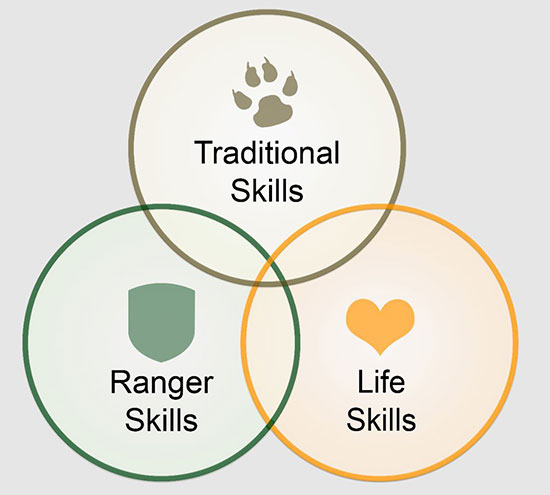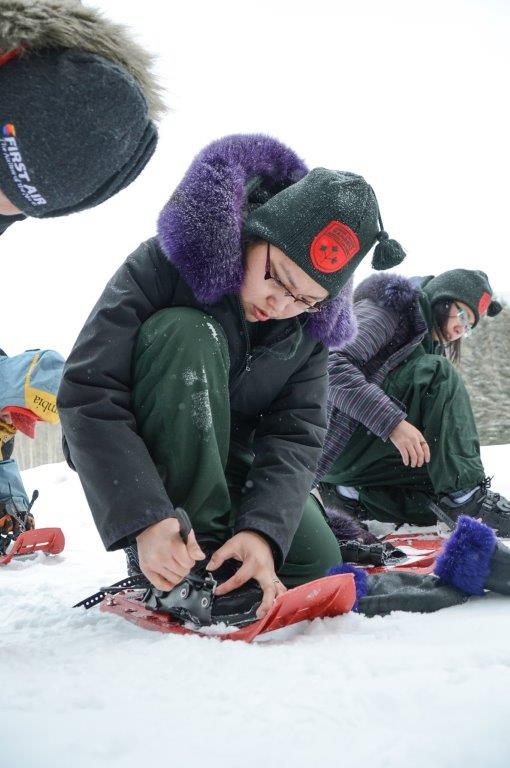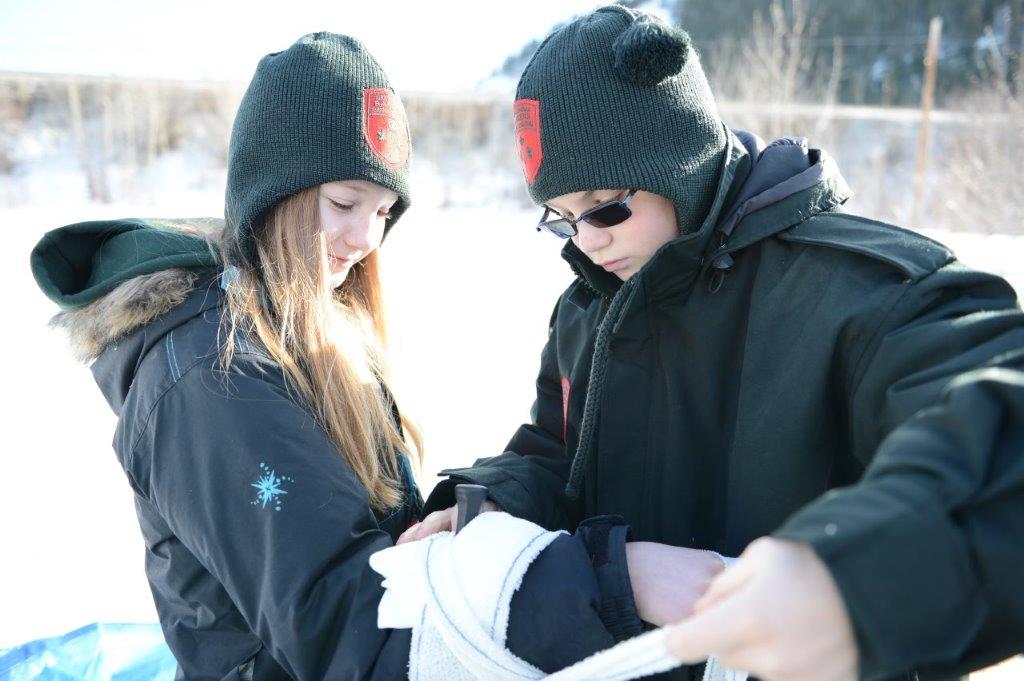What Junior Canadian Rangers do
Every Patrol’s training is unique, because the program can be customized by each community depending on the needs and interests of local young people, the specialties of the adult staff, and the resources available. In general, however, the Junior Canadian Ranger (JCR) program has three basic “circles” of training: ranger skills, life skills, and traditional skills.

Caption
- Traditional Skills
- Ranger Skills
- Life Skills
Three circles of JCR training
Ranger skills
Ranger Skills are modeled after the training received by adult Canadian Rangers. These skills have to do with things like teamwork, leadership, surviving in the wilderness, and helping people in emergency situations. Which skills a Patrol will learn depend on the specialties of the Canadian Rangers in their community, but some Ranger Skills could include:
- First Aid training
- Learning to lead a team
- Hunting and fishing
- Safe firearms handling
- Navigating with a map, compass and GPS
- Safely operating a small boat, snowmobile or all-terrain vehicle
- Repairing small engines
- Tying knots and lashings
- Building an emergency survival shelter
Life skills
Life skills training focuses on helping JCRs strengthen their personal resilience, develop healthy lifestyle habits, make positive choices, and become independent young adults. The Life Skills a Patrol learns will depend on the needs of the JCRs and their community, and might include things such as:
- Community involvement and citizenship
- Planning an activity or event
- Managing stress
- Healthy physical activity
- Resolving conflict
- How to handle bullying, harassment or abuse
- Helping a friend who is struggling with mental illness
- Parenting or baby-sitting skills
- Care and training of domestic animals (like dogs or horses)
- Being a good role model to other young people
Traditional skills
Traditional skills are chosen based on the culture and history of the area, and the talents and experience that community volunteers can bring to the program. Some examples of traditional skills could be:
- Art such as drawing, painting or carving
- Music, dance and drumming
- Historical hunting and fishing practices, such as archery
- Traditional sports or games
- Trades such as carpentry, cooking, or tanning
- Crafts such as beadwork that reflect community customs
- Practicing local or traditional languages
- Learning the history of the area from community leaders or elders
Field training exercises
A Field Training Exercise (FTX) is a chance for your Patrol to train “out on the land,” and practice the skills you have learned at regular meetings throughout the school year. Most patrols hold two FTXs per year.
An FTX usually takes place over a weekend, in a wilderness area near the Patrol’s home community. JCRs and their adult staff will travel to the FTX location with all of their equipment, often moving by boat, ATV, or snowmobile. JCRs may sleep in tents, or in shelters such as igloos, quinzees, or lean-tos.
During the FTX, you will work together with your team to accomplish goals like building a shelter, starting a fire, or cooking a meal. There may be time for hunting or fishing, navigation training, or other on-the-land activities, as well as for telling stories around the campfire. An FTX is all about hands-on learning opportunities, and putting your skills to use in real-world situations.




Enhanced training sessions
Besides the regular training held by their Patrol, JCRs also have the opportunity to participate in Enhanced Training Sessions (ETS). These sessions sometimes take place within the local community, but others can often provide JCRs with a chance to travel to other parts of Canada.
Summer ETS
Every summer, Basic, Advanced, and Leader ETS sessions are offered in different parts of the country. These sessions last about a week, and bring together JCRs from many different Patrols to meet others of the same age and level of experience. Summer ETS allow JCRs to practice and build on the ranger, life and traditional skills they have learned at home, and also offer activities that Patrols may not have the opportunity to do in their own communities.
Some of the activities you might participate in at ETS could include:
- Mountain biking
- Canoeing or kayaking
- Swimming
- Boating
- Tours of attractions in nearby cities
- Hiking and camping
- Rock climbing
- Campfires
- Sports and games
- Hunting and fishing
- Parades or ceremonies
- Riding horses or ATVs
- Touring Canadian Armed Forces bases, ships or vehicles
Marksmanship competitions
Marksmanship competitions are another opportunity for JCRs to travel and meet new people. Marksmanship teaches JCRs how to safely use a rifle, and every year, teams from each Patrol can compete with others from across the country. The top teams may even have the chance to test their skills at the National Marksmanship Competition, which is held in a different part of Canada each year.